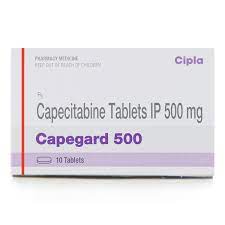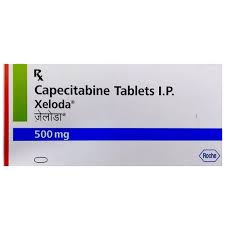Capicet 500mg Tablet 10s CAPECITABINE
Capicet 500mg Tablet 10s belongs to the class of medications used in the treatment of certain illnesses, particularly cancer.
Capecitabine undergoes transformation into 5FU, which then acts as a roadblock for a key player in cell division. This roadblock inhibits the production of ThMP, a crucial component for DNA synthesis Without sufficient ThMP, cells cannot properly create new DNA, slowing down their ability to multiply This disruption in the cell's replication process is a key aspect of Capecitabine's efficacy, particularly in the context of treating cancer.
To achieve optimal results, it is essential to follow your doctor's guidance on the prescribed dose and duration Capecitabine can be taken with or without food, but maintaining a consistent daily schedule is recommended.
Common side effects of Capecitabine may include nausea, vomiting, abdominal pain, diarrhea, fatigue, dehydration, eye irritation, constipation, paresthesia, and anemia.It is important to be aware of these potential side effects and inform your healthcare provider if they persist or worsen.
Capecitabine can suppress bone marrow function, leading to decreased production of blood cells Regular blood cell counts are necessary to monitor for conditions such as anemia, leukopenia, and thrombocytopenia. Caution is advised in individuals with preexisting renal impairment, and dose adjustments may be required based on renal function Regular monitoring of renal function is essential for those with kidney issues.
If a dose of Capecitabine is missed, it should be taken when remembered However, if the next scheduled dose is close, it is advisable to skip the missed dose and continue with the regular dosing schedule Taking two doses at once should be avoided Consulting with your doctor for guidance on managing missed doses effectively ensures the appropriate use of the medication and maintains its effectiveness


Can Capicet tablet be taken safely while breastfeeding?
Capicet tablet is not recommended while breastfeeding. It's unclear if the medication passes into human breast milk, but it could potentially harm a nursing infant. The effects on milk supply are also unknown. If you're taking Capicet tablet and wish to breastfeed, discuss safer medication options with your doctor. They can help you find a treatment plan that allows you to nurse your baby safely while managing your health condition.

Can Capicet tablet be taken safely while pregnant?
Capicet tablet is not recommended during pregnancy. It can harm the unborn baby, as it may affect fetal development. There's limited information on its safety in pregnant women, but animal studies suggest potential risks. If you're pregnant or planning to become pregnant, talk with your doctor about safer treatment options. Your doctor can help create a plan that protects both you and your baby while managing your health condition.

Can I take Capicet tablet with other prescription drugs?
Capicet tablet can interact with other medications, increasing the risk of adverse effects or reducing its effectiveness. For example, it can interact with blood thinners like warfarin, increasing bleeding risk. It may also interact with certain antiviral drugs, affecting how well they work. Always inform your doctor about all medications you're taking, including over-the-counter drugs and supplements. Your doctor can help manage potential interactions and ensure your treatment is safe and effective.

Does Capicet tablet affect appetite?
Capicet tablet can affect your appetite, often leading to a reduced desire to eat. This effect is considered occasional and can vary in severity. If you notice changes in your appetite, talk with your doctor. They can help determine if the changes are related to Capicet tablet and suggest ways to manage them. Maintaining regular meal times and a balanced diet can help support your health during treatment. Your doctor can provide guidance on managing appetite changes.

Does Capicet tablet affect mood?
Capicet tablet can affect mood, causing changes like anxiety or agitation. These mental health side effects are considered occasional and can vary in severity. If you notice changes in your mood or mental well-being, talk with your doctor. These symptoms might be related to Capicet tablet or another health condition. Your doctor can help determine the cause and suggest appropriate support while continuing your treatment. It's important to address any mental health concerns you have.

Does Capicet tablet affect sleep?
Capicet tablet can interfere with sleep, causing issues like insomnia, which is difficulty falling or staying asleep. These sleep disturbances are considered occasional and can vary in severity. If you notice changes in your sleep patterns, talk with your doctor. Sleep problems might be related to Capicet tablet or another health condition. Your doctor can help determine the cause and suggest ways to improve your rest while continuing your treatment. It's important to address any sleep concerns you have.

Does Capicet tablet cause headaches?
Yes, Capicet tablet can cause headaches as a side effect. These headaches are considered occasional and can vary in severity from mild to moderate. If you experience mild headaches, staying hydrated and resting may help. Over-the-counter pain relievers can also be used, but check with your doctor first. If headaches become severe or persistent, contact your healthcare provider. They can help determine if the headaches are related to Capicet tablet or if another cause needs attention.

Does Capicet tablet cause stomach upset?
Yes, Capicet tablet can cause stomach upset, including nausea, vomiting, and diarrhea. These gastrointestinal side effects are common and can range from mild to moderate. Taking Capicet tablet with food might help reduce nausea. If you experience severe or persistent stomach issues, contact your doctor. They can help determine if these symptoms are related to Capicet tablet and suggest ways to manage them. Always inform your healthcare provider about any new or worsening symptoms.

Does Capicet tablet cause weight gain?
Capicet tablet can cause weight changes, often leading to weight loss. This effect is considered occasional and can vary in severity. Weight loss may occur due to side effects like nausea and diarrhea, which can reduce appetite. If you experience significant or rapid weight loss, talk with your doctor. They can help determine if the weight change is related to Capicet tablet and suggest ways to manage it. Maintaining a balanced diet can help support your health during treatment.

Does Capicet tablet interfere with sexual function?
Capicet tablet can interfere with sexual function. Some people may experience erectile dysfunction or a loss of libido, which is a reduced interest in sexual activity. These side effects are considered occasional, meaning they don't happen to everyone. The severity can range from mild to moderate. If you notice changes in your sexual function while taking Capicet tablet, talk with your doctor. They can help determine if the medication is the cause and suggest ways to manage these side effects. It's important to address any concerns you have to maintain your quality of life while undergoing treatment.

Does Capicet tablet limit driving?
Capicet tablet might affect your ability to drive safely. It can cause side effects like dizziness and fatigue, which may impair your driving. If you experience these symptoms, avoid driving until you know how the medication affects you. Pay attention to how your body responds when you first start taking Capicet tablet. If you notice any symptoms that could affect your driving, talk with your doctor. They can help address your concerns and ensure your safety.

Does Capicet tablet make it hard to think or concentrate?
Capicet tablet can cause cognitive side effects like difficulty concentrating or thinking. These effects are considered occasional and can range from mild to moderate. If you notice problems with your thinking or memory, talk with your doctor. These symptoms might be related to Capicet tablet or another health condition. Your doctor can help determine the cause and suggest solutions to manage these issues while keeping your treatment plan on track.

Does Capicet tablet make people tired or drowsy?
Capicet tablet can cause fatigue, which is a feeling of tiredness or weakness. This side effect is considered occasional and can vary in severity. If you notice you're feeling very tired while taking Capicet tablet, talk with your doctor. Your tiredness might be caused by the medication or another health condition. Your doctor can help determine the cause and suggest ways to manage your energy levels. Proper rest, regular physical activity, and a balanced diet can help maintain your energy while on treatment.

For how long do I take Capicet tablet?
Capicet tablet is usually taken for a specific duration as part of a cancer treatment plan. The length of treatment depends on your type of cancer and how your body responds. Your doctor will determine the appropriate duration for your condition. It's important to follow your doctor's instructions and not stop taking Capicet tablet without medical advice. Stopping early could affect the effectiveness of your treatment. Regular check-ups with your doctor will help monitor your progress and adjust your treatment as needed.

How does Capicet tablet work?
Capicet tablet works by interfering with the growth of cancer cells. It belongs to a class of drugs called antimetabolites, which disrupt the DNA and RNA production in cancer cells, preventing them from multiplying. Think of it like a roadblock that stops cancer cells from continuing their journey. This action helps slow or stop the spread of cancer. Capicet tablet is effective in treating certain types of cancer, such as breast and colorectal cancer, by reducing tumor size and improving survival rates.

How do I know if Capicet tablet is working?
Capicet tablet is used to treat certain cancers, like breast and colorectal cancer. You'll know it's working if tests show a reduction in tumor size or cancer markers. Your doctor will monitor your progress through regular check-ups and imaging tests. Improvements in symptoms, like reduced pain or increased energy, can also indicate effectiveness. Regular communication with your healthcare provider is essential to assess how well Capicet tablet is working for your condition.

How do I take Capicet tablet?
Take Capicet tablet as prescribed by your doctor, usually twice daily, about 12 hours apart. It's important to take it within 30 minutes after a meal with water. Do not crush or chew the tablets. If you miss a dose, take it as soon as you remember unless it's almost time for your next dose. In that case, skip the missed dose and continue your regular schedule. Do not double up on doses. Follow any dietary or beverage restrictions your doctor advises while on this medication.

How long does it take for Capicet tablet to start working?
Capicet tablet starts working in your body shortly after you take it, but the full therapeutic effects may take several weeks to become noticeable. The time it takes to see results can vary based on your type of cancer and individual health factors. Your doctor will monitor your progress through regular check-ups and tests to assess how well Capicet tablet is working. It's important to take the medication exactly as prescribed and attend all follow-up appointments to ensure the best outcomes.

How should I store Capicet tablet?
Store Capicet tablet at room temperature, away from moisture and light. Keep it in a tightly closed container to protect it from damage. Avoid storing it in humid places like bathrooms, as moisture can affect its effectiveness. If your pills came in packaging that isn't child-resistant, transfer them to a container that children can't easily open. Always store Capicet tablet out of children's reach to prevent accidental swallowing. Check the expiration date regularly and properly dispose of any unused or expired medication.

Is Capicet tablet effective?
Capicet tablet is effective in treating certain types of cancer, such as breast and colorectal cancer. It works by interfering with cancer cell growth, slowing or stopping their spread. Clinical studies show Capicet tablet improves survival rates and reduces tumor size in many patients. Its effectiveness can vary based on individual health conditions and cancer type. Your doctor will monitor your progress and adjust your treatment as needed to ensure the best outcomes.

Is Capicet tablet safe for the elderly?
Elderly patients may be more vulnerable to the side effects of Capicet tablet, such as diarrhea and hand-foot syndrome, which is redness and swelling of the hands and feet. They may also have other health conditions that require careful monitoring. Capicet tablet can be used safely in the elderly with appropriate dose adjustments and close supervision by a healthcare provider. Regular check-ups are important to manage any side effects and ensure the treatment is effective.

Is it safe to drink alcohol while taking Capicet tablet?
It's best to avoid alcohol while taking Capicet tablet. Alcohol can increase the risk of side effects like nausea and liver problems. It may also interfere with the medication's effectiveness. If you choose to drink occasionally, limit your alcohol intake and watch for any warning signs like increased nausea or liver discomfort. Talk with your doctor about alcohol use while on Capicet tablet to get personalized advice based on your health situation.

Is it safe to drink coffee or tea while taking Capicet tablet?
You can drink coffee and tea while taking Capicet tablet, as there's no known interaction between caffeine and the medication. However, both Capicet tablet and caffeine can cause stomach upset. Drinking too much caffeine might increase this risk. Enjoy caffeinated drinks in moderation and ensure you stay hydrated by drinking plenty of water. If you experience stomach issues, talk with your doctor. They can help determine if caffeine is affecting your treatment.

Is it safe to exercise while taking Capicet tablet?
You can exercise while taking Capicet tablet, but be mindful of your body's response. This medication can cause fatigue and weakness, which might affect your exercise capacity. Listen to your body and avoid strenuous activities if you feel tired. Stay hydrated and take breaks as needed. If you experience unusual fatigue or other symptoms during exercise, slow down or stop and rest. Consult your doctor if you have concerns about exercising while on Capicet tablet.

What are Capicet tablet possible harms and risks?
Common side effects include diarrhea, hand-foot syndrome (redness and peeling of skin on palms and soles), nausea, and fatigue. Serious side effects, like severe diarrhea, chest pain, or infections, should be reported immediately.

What disease or symptom is Capicet tablet used for?
Capicet tablet is used to treat certain types of cancer, including breast and colorectal cancer. It helps slow or stop the growth of cancer cells by interfering with their DNA and RNA production. Capicet tablet is often used in combination with other cancer treatments to enhance its effectiveness. It can be used alone or as part of a comprehensive treatment plan. Your doctor will determine if Capicet tablet is appropriate for your specific cancer type and treatment needs.

What is Capicet tablet?
Capicet tablet is a chemotherapy medication used to treat certain types of cancer, such as breast and colorectal cancer. It belongs to a class of drugs called antimetabolites, which work by interfering with cancer cell growth and slowing or stopping their spread. Capicet tablet is often used in combination with other cancer treatments to enhance its effectiveness. It helps reduce tumor size and improve survival rates in many patients. Your doctor will determine if Capicet tablet is appropriate for your specific cancer type and treatment plan.

What is the usual dose of Capicet tablet?
The usual starting dose of Capicet tablet for adults is 1,250 mg/m² taken twice daily for two weeks, followed by a one-week rest period. This cycle is repeated every three weeks. Dose adjustments may be necessary based on your response and any side effects. The maximum recommended dose should not exceed 2,500 mg/m² per day. Special populations, such as the elderly, may require dose adjustments. Always follow your doctor's specific dosing instructions for your health needs.

Who should avoid taking Capicet tablet?
Capicet tablet should not be used if you're allergic to it or its ingredients. It's contraindicated in patients with severe kidney disease, which affects organs that filter waste from your blood, and in those with a known deficiency of the enzyme DPD, which is crucial for breaking down the drug. Use caution if you have liver problems or are pregnant, as Capicet tablet can harm the baby. Always consult your doctor about these concerns before starting treatment.















.svg)
